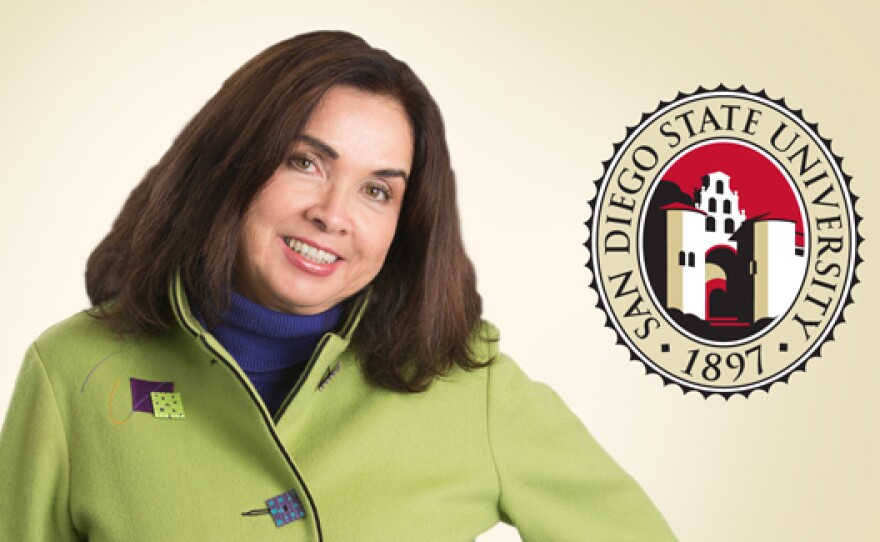Adela de la Torre, a nationally known voice on Latino and Chicano health issues, was named Wednesday as the next president — and first woman to permanently lead San Diego State University in its 121-year history.
The 63-year-old educator's appointment as the ninth permanent president of SDSU was announced this morning by the California State University Board of Trustees at its meeting in Long Beach. De la Torre, who is currently the vice chancellor for student affairs at UC Davis, will take over some time before the end of June.
"I am excited to join the vibrant university community that exists both in San Diego and the Imperial Valley, and I look forward to meeting and working with faculty, staff, students, alumni and supporters to further the SDSU mission," she said in a statement. "SDSU boasts a robust and dynamic variety of academic offerings taught by world-class faculty as well as a commitment to serve a brilliant and diverse population of students. It is an incredibly prestigious university and a wonderful point of pride for San Diego."
De la Torre will take over the top job at SDSU from Sally Roush, who has served as interim president since Elliot Hirshman left at the end of the last school year, after six years at the helm, to become president of Stevenson College in Maryland.
"Adela is a skilled, student-success-focused administrator, and most importantly is a visionary leader," said Adam Day, the vice chair of the CSU Board of Trustees, who led the search committee. "She emerged from a deep pool of candidates as the perfect person to lead the university."

RELATED: SDSU West Backers Submit Signatures To Take Initiative To City Council
De la Torre's UC Davis biography describes her as "an agricultural and health economist, and nationally recognized expert on Latino and Chicano health issues." She was previously the chair of the Department of Chicana/o Studies and was director of the Center for Transnational Health at the university, where her salary and benefits in 2016 totaled $352,640.
Prior to UC Davis, she was the director of the Mexican American Studies and Research Center at the University of Arizona, where she "successfully developed the first graduate program in Mexican American Studies and founded the College of Medicine's first federally funded Hispanic Center of Excellence," according to her biography.
De la Torre earned all of her degrees at UC Berkeley, including a bachelor's in political economy of natural resources and master's and doctoral degrees in agricultural and resource economics.
One of the biggest question marks surrounding her hiring will be her skills as a fundraiser, an area where Hirshman excelled. He helped SDSU raise a record $816 million during its last fundraising campaign.
At UC Davis, De la Torre "generated more than $19 million in external funds to support educational outreach, recruitment, health education and training programs," according to her biography.
She will come aboard at a critical time for the roughly 35,000-student university, which is bursting at the seams of its nearly 290-acre campus.
A proposal known as SDSU West is being pushed by university supporters, who recently submitted more than 106,000 petition signatures in hopes of getting the concept on the ballot, likely in November. They're hoping the recent success of an SDSU fundraising campaign that raised more than $800 million is a sign of momentum in support of the university's expansion efforts.
Under the proposal, the SDCCU Stadium property would be sold to the university, which would then create a development plan for the land.
The Friends of SDSU group that is leading the SDSU West project commended the university system for the hire.
"President de la Torre will play a critical role in shaping the university's future, including the potential expansion in Mission Valley made possible by the SDSU West initiative," the group said in a statement. "SDSU West creates a path forward for the landlocked university to grow its enrollment capabilities, bolster its academic research power and continue to meet the higher education needs of our region."
RELATED: SoccerCity Backers Blast SDSU West Plan For Mission Valley Development
School officials last fall outlined their vision for the project, including 1.6 million square feet of classroom and research buildings, a river park and open space, 4,500 housing units, retail shops, a pair of hotels and a multi-use, 35,000-seat stadium for college football and other sports.
SDSU Interim President Roush and JMI Realty CEO John Kratzer said the project would be mostly funded by public-private partnerships and not rely on taxpayer financing. The main exception would be the stadium, which would be funded by bonds to be paid back by future revenues.
The land is three trolley stops from the built-out main campus.
The SDSU West project, however, is competing with a proposal known as SoccerCity, which would turn the stadium property into a soccer-centric development that supporters hope will be home to a new Major League Soccer franchise. The proposal, which has already qualified for the ballot, would include a hybrid soccer and college football stadium, a park along the San Diego River, 2.4 million square feet of office space, 740,000 square feet for retail space, 4,800 multi-family residential units and 450 hotel rooms.






